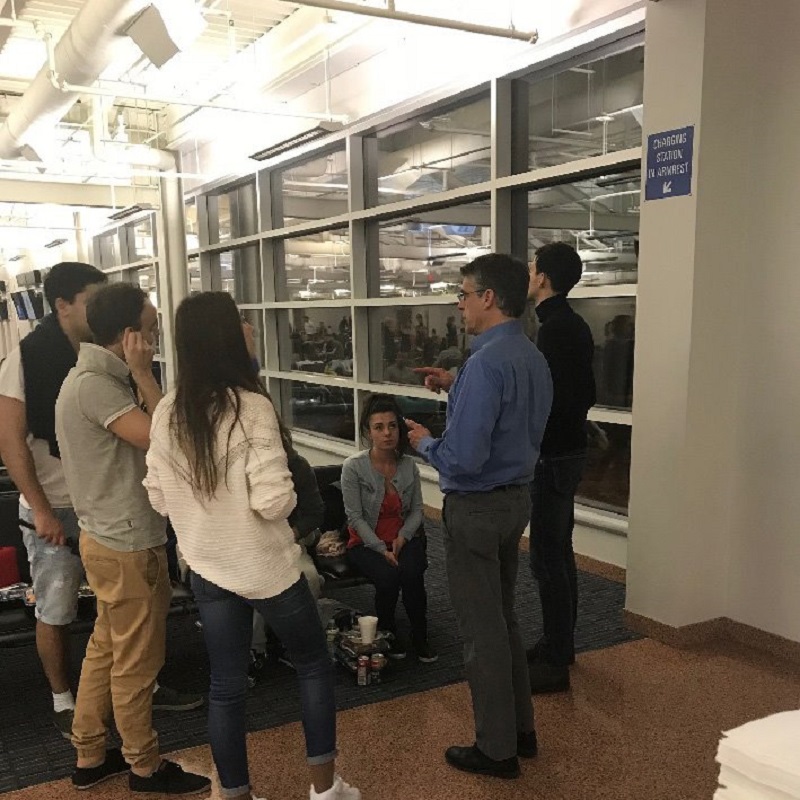From Rowan with love: History professor serves as translator for Russian travelers in need
From Rowan with love: History professor serves as translator for Russian travelers in need

Three hundred and eight passengers and crew of a Russian airliner stranded at the Atlantic City Airport on Jan. 31 found a translator and friend in Rowan University history professor James Heinzen.
Summoned to the airport after the Azur Air flight bound for Cuba made an emergency stop in Atlantic City due to a fuel leak, Heinzen spent 10 hours serving as a translator for the Russians.
A Rowan professor since 2000, Heinzen is a scholar of Russian history and speaks fluent Russian. Almost none of the passengers and crew on the grounded Boeing 767 spoke English, Heinzen said.
Throughout the day, Heinzen and three other translators worked to share information with the passengers and to address their questions and needs.
Many of the passengers were families with young children, Heinzen said. They were unable to leave the terminal because they couldn’t clear customs to be in the U.S., Heinzen noted. The plane made its emergency landing in Atlantic City around 3:30 a.m. and the terminal was closed to normal traffic, according to Heinzen.
“This was unprecedented for the Atlantic City Airport,” said Heinzen, who drove straight to Atlantic City after getting the call from College of Humanities & Social Sciences Dean Nawal Ammar that his services were needed. Officials at the South Jersey Transportation Authority initially contacted Rowan Vice President for Research Shreekanth Mandayam seeking a Russian-speaking professor.
Heinzen arrived at the airport at 2:30 p.m. A plane from Cuba landed at around 8 p.m. and took the passengers to their vacation destination, said Heinzen, who was at the airport until 10:30 p.m.
The American Red Cross pitched in to provide food and cots to the passengers as airport officials worked diligently to give updates and offer support, Heinzen said.
The passengers’ requests ranged from needing assistance with charging their cell phones to requesting basic supplies, such as toiletries, according to Heinzen.
“The airport handled things really, really well. They instituted a humanitarian assistance program--feeding people, putting up cots,” Heinzen said. “My role was to answer questions and assist in any way I could. People were very grateful.”
Along the way, Heinzen enjoyed some enlightening conversations with the Russians, who wanted to know about his background and his areas of expertise.
A social historian, Heinzen teaches courses devoted to modern Russian and Soviet history, the Cold War, historical methods, and other courses. His research interests include the social, political, and cultural history of the Soviet Union, Stalinism, crime and corruption in Soviet history, everyday life, and revolution.
Heinzen is the author of The Art of the Bribe: Corruption under Stalin, 1943-1953 (2016) and Inventing a Soviet Countryside: State Power and the Transformation of Rural Russia, 1917-1929 (2004).
“I had some very interesting conversations with people,” said Heinzen. “They wanted to know why I was there. We had some interesting discussions about relations between the two countries in the Russian and American media.
“It was a very interesting experience overall. I’m very glad I went.”
Of course, Rowan has a proud legacy of connecting with the Russian people.
Fifty-one years ago, the University, then known as Glassboro State College, hosted the Summit at Hollybush, a meeting over two days between President Lyndon B. Johnson and Soviet Premier Alexei Kosygin.
The talks between the leaders of the two superpowers helped
quell Cold War tensions between the two countries. Johnson dubbed
the talks, held at the University’s historic Hollybush Mansion,
“the spirit of Hollybush.”